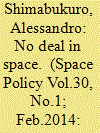| Srl | Item |
| 1 |
ID:
140082


|
|
|
|
|
| Summary/Abstract |
Many studies have examined the formation of interstate rivalries, but few provide a theoretical mechanism capable of explaining why some neighboring states experience protracted conflict while others do not. To address this question, we theoretically link bargaining theories of conflict with issue-based explanations of conflict to offer a novel application of the commitment problem mechanism. We argue that when neighboring states disagree over border territory endowed with a potential source of power (i.e. strategic or economic value), it is difficult for either side to commit credibly in the future to comply with agreements made today. Consequently, neighboring states may be reluctant to make concessions that could enhance their adversary’s future bargaining power. This reluctance, in turn, increases the likelihood of bargaining failure, thereby also increasing the likelihood that the dispute festers and the relationship evolves into a rivalry. Using recently reported data on border settlement and three measures of rivalry, we find systematic evidence for our theoretical expectations. Unsettled borders increase the likelihood of rivalry onset. This relationship, however, seems driven by border territory containing strategic and economic endowments – the exact type of territory that theoretically drives commitment problems. We therefore conclude that not all territory matters for the onset of contiguous rivalries.
|
|
|
|
|
|
|
|
|
|
|
|
|
|
|
|
| 2 |
ID:
091600


|
|
|
|
|
| Publication |
2009.
|
| Summary/Abstract |
The authors' theory contributes an alternative domestic politics pathway to traditional bargaining models of war termination. In bargaining models, the rational updating process that produces an overlapping bargaining space can develop a significant lag, which extends the war beyond a logical ending point. The authors posit that a change in the domestic governing coalition is often necessary to kick-start this updating process once it has become bogged down through preference, information, and entrapment obstacles. The authors demonstrate that domestic coalition shifts are a critical path to peace, using survival analysis techniques on Bennett and Stam's (1996) war-level data set of wars (1862-1990) and a new belligerent-level data set of wars (1945-2006). These tests show that because war policies can become institutionalized over time, there is a very strong link between coalition shifts and war termination.
|
|
|
|
|
|
|
|
|
|
|
|
|
|
|
|
| 3 |
ID:
095133


|
|
|
|
|
| Publication |
2010.
|
| Summary/Abstract |
This article examines various phases in the Nagorno-Karabakh (NK) negotiations between Armenia and Azerbaijan using a Multi-Issue Bargaining Model - a modified version of the traditional bargaining model. It offers micro-level and phase-by-phase analysis of the negotiation process, mediation efforts and proposed mechanisms for the settlement of the NK conflict. Issues on the negotiation table and the evolution of the Azerbaijani and Armenian positions over time constitute a central focus of the article. The multi-issue model is applied to each negotiation phase in the NK conflict from 1994 until 2009.
|
|
|
|
|
|
|
|
|
|
|
|
|
|
|
|
| 4 |
ID:
132563


|
|
|
|
|
| Publication |
2014.
|
| Summary/Abstract |
Space systems are essential to the global economy and security. The possibility of disruptions arising from competition between the United States and China through the testing and deployment of weapons in space has led to concerns over an incipient space arms race that would threaten satellites, leading to international calls for a space arms control treaty. The paper presents a rationalist theory analysis on the lack of progress in establishing such a treaty, identifying the United States' position of primacy in the global order and its preeminence in space as a primary cause.
|
|
|
|
|
|
|
|
|
|
|
|
|
|
|
|
| 5 |
ID:
193059


|
|
|
|
|
| Summary/Abstract |
The United States government’s inability to view the conflict with the Taliban through the lens of the bargaining model of war was a fundamental element of its failure in Afghanistan. This problem was reinforced by a dysfunctional civil–military relations shaped by Samuel Huntington’s theory of objective control, resulting in the military pursuing campaigns of attrition that fit its organizational preferences but did not advance civilian political goals. These issues are evident in three different moments during the War in Afghanistan where the U.S. failed to seize an opportunity that could have changed the result of the conflict.
|
|
|
|
|
|
|
|
|
|
|
|
|
|
|
|